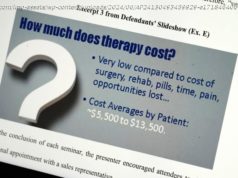The only silver lining for Equifax investors is that larger breaches tend to have a smaller cost per breach.
Equifax shares plunged more than 13% Friday on news of a massive security breach. The breach reportedly impacted as many as 143 million Americans.
Deutsche Bank analyst Kevin McVeigh issued a note discussing just how costly much smaller prior breaches have been at other companies. Here’s a breakdown of some of the numbers:
TJX Companies (2007) — 77 million records impacted, $2.22 cost per breach. Heartland Payment Systems (2009) — 130 million records impacted, $1.08 cost per breach. Sony (2011) — 94 million records impacted, $1.26 cost per breach. Global Payments Inc. (2012) — 2 million records impacted, $62.67 cost per breach. Target (2013) — 40 million records impacted, $5.05 cost per breach.
More: With one word, ‘impeachment, ‘ stocks tumble in U. S., Brazil
More: The story of Bell’s Brewery: From stoner beer baron to craft beer icon
“While this is a fluid situation + EXTREMELY difficult to quantify, we have put our best effort + suggest the financial impact could be in the range of $300-$400M (~5% market cap) given costs for credit monitoring, regulatory fine + penalties, ” McVeigh wrote.
Perhaps the only silver lining for Equifax investors is that larger breaches tend to have a smaller cost per breach, he said.
As it stands, the Equifax breach is one of the five largest cybersecurity breaches in history, according to CSO. Here’s a look at the top five:
Heartland Payment Systems (2009) — 134 million customers impacted. Equifax (2017) — 143 million customers impacted. eBay (2014) — 145 million customers impacted. Adult Friend Finder (2016) — 412.2 million users impacted. Yahoo (2013) — 1.5 billion customers impacted.
For investors wondering whether or not the Equifax sell-off is a trading opportunity, TD Ameritrade chief strategist JJ Kinahan told Benzinga traders are better off not trying to pick a potential bottom in the stock.
« In these situations, the initial reaction is usually going to be a very harsh one, » Kinahan said. « The conundrum is you’re never sure if it’s going to be a small event and they can recover (i.e., Target) or if it’s going to be very prolonged. This is truly their business, so this is one that may last a bit.
“What I would truly tell people is if you don’t have a position, you don’t have to be a person that has to pick the bottom. I would let it sort itself out over the next few weeks and then get back in. »
Benzinga is a financial media outlet and a content partner of the Detroit Free Press. Get real-time, actionable investment advice at Benzinga.com.






